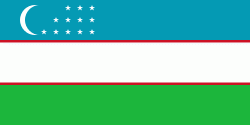Khiva (Xiva)
Khiva (Xiva/Хива, خىۋا;, Xīveh; alternative or historical names include Kheeva, Khorasam, Khoresm, Khwarezm, Khwarizm, Khwarazm, Chorezm, خوارزم and ) is a district-level city of approximately 93,000 people in Xorazm Region, Uzbekistan. According to archaeological data, the city was established around 1500 years ago. It is the former capital of Khwarezmia, the Khanate of Khiva, and the Khorezm People's Soviet Republic. Itchan Kala in Khiva was the first site in Uzbekistan to be inscribed in the World Heritage List (1991). The astronomer, historian and polymath, Al-Biruni (973–1048 CE) was born in either Khiva or the nearby city of Kath.
The origin of the name Khiva is unknown, but many contradictory stories have been told to explain it.
A traditional story attributes the name to one of the sons of the prophet Noah: "It is said that Shem, after the flood, he found himself wandering in the desert alone. Having fallen asleep, he dreamt of 300 burning torches. On waking up, he was pleased with this omen, he founded the city with outlines in the form of a ship mapped out according to the placement of the torches, about which he had dreamt. Then Shem dug the Kheyvak well, the water from which had a surprising taste. It is possible to see this well in Ichan-Kala (an internal town of Khiva City) even today."
Another proposal is that the name comes from the word Khwarezm, altered by borrowing into Turkic as Khivarezem, then shortened to Khiva.
Another possibility is that it came from the Śiva tribe of the Battle of the Ten Kings.
The origin of the name Khiva is unknown, but many contradictory stories have been told to explain it.
A traditional story attributes the name to one of the sons of the prophet Noah: "It is said that Shem, after the flood, he found himself wandering in the desert alone. Having fallen asleep, he dreamt of 300 burning torches. On waking up, he was pleased with this omen, he founded the city with outlines in the form of a ship mapped out according to the placement of the torches, about which he had dreamt. Then Shem dug the Kheyvak well, the water from which had a surprising taste. It is possible to see this well in Ichan-Kala (an internal town of Khiva City) even today."
Another proposal is that the name comes from the word Khwarezm, altered by borrowing into Turkic as Khivarezem, then shortened to Khiva.
Another possibility is that it came from the Śiva tribe of the Battle of the Ten Kings.
Map - Khiva (Xiva)
Map
Country - Uzbekistan
 |
 |
| Flag of Uzbekistan | |
The first recorded settlers in what is now Uzbekistan were Eastern Iranian nomads, known as Scythians, who founded kingdoms in Khwarazm (8th–6th centuries BC), Bactria (8th–6th centuries BC), Sogdia (8th–6th centuries BC), Fergana (3rd century BC – sixth century AD), and Margiana (3rd century BC – sixth century AD). The area was incorporated into the Iranian Achaemenid Empire and, after a period of Macedonian rule, was ruled by the Iranian Parthian Empire and later by the Sasanian Empire, until the Muslim conquest of Persia in the seventh century.
Currency / Language
| ISO | Currency | Symbol | Significant figures |
|---|---|---|---|
| UZS | Uzbekistan som | so'm or Ñўм | 2 |
| ISO | Language |
|---|---|
| RU | Russian language |
| TG | Tajik language |
| UZ | Uzbek language |















